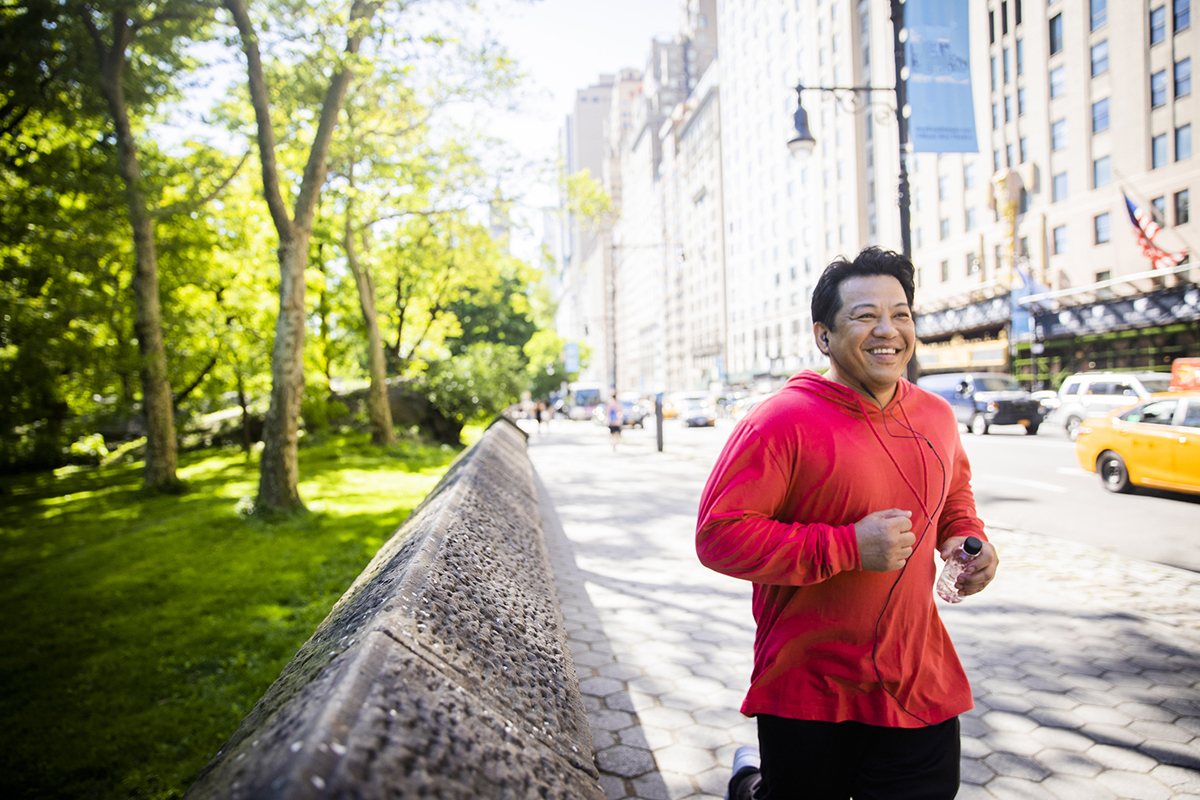“Above all, do not lose your desire to walk. Every day I walk myself into a state of well-being and walk away from every illness. I have walked myself into my best thoughts, and I know of no thought so burdensome that one cannot walk away from it.” – Søren Kierkegaard
I exercise for several reasons. For one, it’s energizing. When I feel inertia overcoming me, I like to go for a walk, run, bike ride or swim, or hit the weights. Usually, I can power through it, and emerge to a higher level of focus and concentration, increasing my productivity.
There are also the undeniable health benefits—to the heart, brain, metabolism, and the musculoskeletal system. There may even be an edge in preventing or surviving cancer.
Of course, there’s a vanity element. Looking buff is rewarding. Or, as Kevin Spacey famously replied when queried as to his exercise goals in the film American Beauty: “I wanna look good naked!”
Exercise also helps to optimize sleep, which is a prime determinant of health.
But one of the main reasons I exercise is to regulate mood. In what may come as a surprise to some of you who see me in my public guise as cool and authoritative, I tend to be on the anxious side.
I’m not an outlier. Anxiety is a huge and growing problem in America. A recent survey showed that, between 2008 and 2018, anxiety rates soared by 30% among US adults. In the youngest age group—18 to 25—it spiked 84%. And this was before Covid, which has dramatically accelerated the trend.
It’s gotten so bad that recently there’s been a call for universal screening for anxiety as part of routine doctors’ visits, like checking for cholesterol, blood pressure, and blood sugar:
“In September of this year, the U.S. Preventive Services Task Force produced [draft] recommendations based on their research that all adults under age 65 should be screened for anxiety, and one of the things that prompted this was that they noticed an increase in the prevalence of anxiety and depression of about 6% between 2020 and 2021.”
I’m a little skeptical about how this will be implemented. The typical beleaguered primary care practitioner has to see 20-30 patients per day while ruling out life-threatening conditions, hardly a scenario for having a leisurely discussion about a patient’s psychological well-being.
Moreover, unless we’re psychiatrists, we get little training in how to identify and treat anxiety. And, unless we have behavioral therapists in our offices, there’s not much we can do other than proffer a band-aid prescription for anxiety meds or antidepressants, with limited efficacy, and significant side effects and dependency risk.
Which brings us back to exercise. There is ample scientific evidence that keeping moving reduces anxiety. A 2010 review found evidence that exercise training programs lasting no more than 12 weeks, using session durations of at least 30 minutes, curbed anxiety among sedentary patients with chronic illnesses.
Another review evaluated the impact of exercise intensity on anxiety and found a dose-response effect: “Exercise programmes are a viable treatment option for the treatment of anxiety. High intensity exercise regimens were found to be more effective than low intensity regimens.”
This is not new. As early as the 70s, there was the “The Running Psychiatrist”, the late Dr. Thaddeus Kostrubala, author of The Joy of Running.
I think part of the way exercise works its magic on mood is via desensitization to feelings commonly associated with anxiety, like the way we treat phobias. For example, I sometimes approach the prospect of a long run, bike ride, or swim with some apprehension. Do I still have the “right stuff”? Then, as adrenaline kicks in and my heart rate soars I enter a controlled “fight or flight” zone. As my workout progresses, my body and nervous system become accustomed to a hyper-activated state. But unlike a panic attack, it’s modulated and voluntary. The longer I remain safely in this deliberate condition of controlled stress, the more I become accustomed to it, helping me to achieve mastery over my altered physiology. The effect is cumulative with successive workouts.
In seeming agreement with this theory, one study reports, “Acute studies suggest that exercise immediately increases panic-related symptoms, but allows the reduction of artificially induced increased panic attacks and anxiety.”
Of course, exercise generates “feel-good” endogenous chemicals like endorphins—famously responsible for the “runner’s high”. There are also exercised-associated increases in beneficial monoamine levels, brain-derived neurotrophic factor (BDNF), serotonin, brain mitochondrial efficiency, and oxidative stress. And exercise conditioning has a regulatory effect on the autonomic nervous system, restoring “vagal tone”—the branch of the involuntary nervous system that mediates heart rate and variability, blood pressure, and breathing.
Exercise also helps us avoid dependency on medications for blood sugar and blood pressure, with their frequent downer effects on mood.
Then there are the known benefits of exercise on resilience—which is the antithesis of fear. It’s no accident that special forces trainees undergo intense physical conditioning. It’s not just to increase their ability to haul heavy packs and weapons over challenging terrain; surmounting physical rigors is known to enhance mental fortitude in daunting circumstances.
A recent study explored the relationship between exercise and the quality of resilience during Covid. It concluded:
“Exercise is strongly correlated to resilience and during a pandemic such as COVID-19 it becomes a mechanism in which to moderate resilience. The relationship between exercise and resilience is supported by this study.”
Another paper (“Beneficial Effects of Exercise on Depression and Anxiety During the Covid-19 Pandemic: A Narrative Review”) proposes activity as an antidote to the pandemic’s effects on mental health. Paradoxically, gyms were shuttered during the initial lockdowns—while liquor stores and cannabis dispensaries remained open as “essential”. The authors conclude:
“Taken together, the COVID-19 pandemic not only affects physical health, but also mental health. Regular physical exercise is beneficial for mental health, and able to alleviate the levels of depression and anxiety during the COVID-19 pandemic. Staying physically active during the COVID-19 pandemic would contribute to the attenuation of the side effects of COVID-19 on mental health after the pandemic.”
Unfortunately, Covid had a net negative impact on exercise participation.
“The level of physical activity was significantly reduced during the social distancing period. Prior to the COVID-19 pandemic period, 69% of the volunteers (83% male and 46% female) were classified as very active, and during the social distancing period, this percentage dropped to 39% . . . Those who reduced their level of physical activity had the highest levels of mood disorders. Therefore, physical activity programs should be encouraged.”
Covid had the opposite effect on me. I had fortunately undergone successful arthroscopic surgery on a torn knee meniscus just prior to the lockdowns that put a halt to elective medical procedures. Then, with gyms and pools closed, I had no recourse other than to go outside and resume my running, cycling and swimming. At home I used light weights, floor exercises and stretch bands to maintain my resistance training.
I used exercise to offset the dread engendered by a media barrage of negative information about Covid, and to stave off the boredom from the suspension of my social contacts, travel, and outside activities. In a sense, I powered through it, as hopefully many of you did. The net result is that I cultivated my resilience by focusing on something I could control—my activity levels.
How many of you use exercise as a strategy for mood modulation? Its benefits are lasting, proven, and come without harmful side effects.
For more tips on battling stress and anxiety, check out my Intelligent Medicine Stress Hub and the Intelligent Medicine Stress Protocol.








